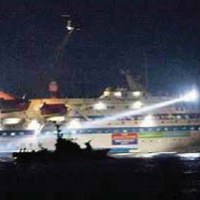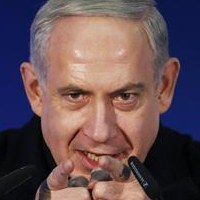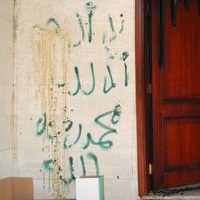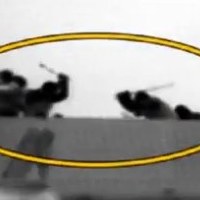Sun, July 04, 2010 | Aawsat.com | al-Mashriq | Wikipedia | By Crethi Plethi
Lebanon’s Grand Ayatollah Muhammad Hussein Fadl-Allāh one of Shiite Islam’s main religious figures, died Sunday after a long illness. He was 74. Mohammed Hussein Fadlallah has been receiving treatment in a Beirut hospital for the past 12 days, but his condition deteriorated Friday.
Fadlallah, known for his staunch anti-Israel and anti-American stance, helped in the rise of Lebanon’s Shiite community in the past decades and made Lebanon a satellite of Shi’ite Tehran. He was one of the founders of Iraqi Prime Minister Nuri al-Maliki’s governing Dawa Party and was believed to be its religious guide until the last days of his life and serves as the spiritual guide for many key Shi’ite leaders in Iraq. He was described in the 1980s as a spiritual leader of the Lebanese militant Hezbollah — a claim both he and Hizballah always denied. “I reject it not because I reject Hezbollah, but because I refuse to be given a title that I don’t possess,” Fadlallah said.
During Lebanon’s 1975-90 civil war, he was linked to Iranian-backed Shiite militants who kidnapped Americans and other Westerners, and bombed the U.S. Embassy and Marine base in Lebanon, killing more than 260 Americans. Fadlallah long advocated boycotting American and Israeli products.
In his sermons, he called for armed resistance to the Israeli occupations of Lebanon, the West Bank and the Gaza Strip, along with opposition to the existence of Israel.
Fadlallah’s title was “sayyed” — reflecting a claim of direct descent from the Prophet Muhammad’s daughter Fatima and her husband Imam Ali, revered by Shiites as a saint. Fadlallah escaped several assassination attempts.
Bahraini Shiite cleric Abdullah al-Ghuraifi, described him as a “father, religious authority and spiritual leader to all Islamic movements in the Arab and Islamic world” at a Beirut news conference.
Lebanese Prime Minister Saad Hariri made a political statement in calling Fadlallah a “great national and spiritual scholar.” “He was at all times and circumstances the voice of moderation, calling for the unity of Lebanese in particular and the Muslims in general, rejecting — and issuing religious edicts against — strife, and calling for dialogue as a mean to resolve differences,” Hariri said. [UPI.com; Sun, July 04, 2010].
But consider these words from Hizballah’s spiritual leader, Sheik Muhammad Fadlallah:
“What martyrdom is greater than making yourself a human bomb detonating it among the enemy? What spiritualism is greater than this spiritualism in which a person loses all feeling of his body and life for the sake of his cause and mission?”
“I was born in 1935 [november 16] in Najaf, Iraq, to a Shi’i Muslim family from Aynata in southern Lebanon. My father, Ayatollah Abd-al Rauf Fadlallah, was an alim (religious scholar) in Najaf, a shrine and university city. I underwent all of my schooling in Najaf, where Muhammad Baqir al-Sadr also studied. Baqir al-Sadr became my friend and mentor, and it was he who encouraged me to combine my religious convictions with political and social participation. Consequently, when the ulama (community of religious scholars) appointed me, in 1966, to Nab’ah, an impoverished suburb of Beirut, I began opening community centers and cultural clubs for our youth, as well as free clinics.”
“When the Maronites, a Lebanese Christian sect, destroyed Nab’ah, in 1976, I went to southern Lebanon with fellow Shi’i Muslim refugees. Several years later, when the Ayatollah Ruhollah Khomeini launched his successful revolution in Iran, I began to recognize the necessity for an Islamic revolution in Lebanon.”
“Since 1985, I have been president of the Lebanese council of Hizbullah. In that capacity, I helped draft the Lebanese Islamic Constitution, which was inspired by the model cast by my friend Baqir al-Sadr in Najaf in 1979. In addition to drafting the constitution, I provide authoritative opinions, advice, and decisions for Hizbullah members and Islamists everywhere, as we prepare for a full Islamic revolution. Such a revolution will lead to an Islamic economy and social structure. Despite my influence, however, I do not participate directly with political or military affairs any longer. Instead, I have assumed the unofficial role of spiritual leader for the party, serving as a highly influential beacon of Islamic truth for all the oppressed peoples of the world.”
“Politically, my primary objective is to see the Islamic revolution in Lebanon brought to fruition. The newly dissolved and recreated Lebanese government, led by men like Hrawi, Berrih, and Jumblatt, is clearly an obstacle in the path to revolution, and I believe that this government has been put together by imperialist Americans hoping to achieve their own ends in the Middle East. The United States and Israel are full partners in a war against the people of the Middle East. Therefore, we must secure their departure from Lebanon as a precursor to Israel’s obliteration from existence, and as the first step towards liberating our people from the talons of Western imperialism. Only then may we begin to construct a political system favored by the people based upon the teachings of the holy Quran.”
“All those who seek peace with Israel are traitors to our cause, including the treasonous Yasir Arafat. We reject the accords signed between Israel and the PLO, just as we have rejected Camp David, the Fahd, Fez, Reagan, Brezhnev, and French-Egyptian plans, and any other plan that offers even tacit recognition of the Zionist entity.”
“‘Land for Peace’ is a betrayal of Palestinian blood and of the sacred cause of Palestine. Arafat, just like Israel, America, and the rest of the Western world stand in our way of revolution. So too, the secular government in Lebanon stands in our way. So too the Amal with its Syrian ties and secular orientation. The latter two have gone so far as to combat their kin, the Palestinian refugees in Beirut, during the camp wars of the mid-80’s. We stood up for our people then, as we do now, while traitors like the Syrians strive for accords with the Zionists and imperialists.”
“Only Iran stands firmly by the Palestinian cause. Khomeini provided inspiration with the Iranian revolution, and then military and financial support in later years. Since Khomeini’s death, Iran under Khamenai and Rafsanjani has continued to support us, although to a lesser degree. Still, they remain allies against the Zionist/Imperialist menace.”
“The Hizbullah has also cultivated allies from a wide array of groups, including the Islamic Resistance Movement, Jund Allah, the Hussein Suicide Squad, al Dawa, Holy Warriors for Freedom, The Organization of the Oppressed of the Earth, Islamic Amal, and Revolutionary Justice Organization. Together, we fight for an Islamic nation.”
“In addition, as articulated in the Hizbullah’s covenant, also known as the open letter, we consider all the downtrodden people of the world to be our allies. Whether they are Muslim or not, we believe that they will discover a path to freedom through Islamic principles.”
“Thus far, we have celebrated one major achievement, namely the military defeat of the Israeli occupation forces in Lebanon. February 18, 1985 stands as a triumphant day as Sidon was freed from Zionist clutches. Yet, that was but a small step towards the ultimate goal: Our finest hour will arrive when the revolution is complete and Lebanon is reconstructed along Islamic lines.”
“For the most part, my political ideologies are shaped by theological convictions. I write commentaries on the Quran, as well as spiritual poetry. However, I also try to include historical and psycho-sociological perspectives in my speeches and sermons. I am not an active policy-maker; my influence is manifested through speeches and sermons. I welcome cooperation with non-Muslims, and I am willing to leave margin for compromise, provided no interference arises hindering the creation of an Islamic state. I do not believe that conditions are right yet for an Islamic state in Lebanon due to the significant non-Muslim minority, but the time will come soon for revolution–that is our primary objective.”
“Some excerpts from my writings, speeches, and interviews”:
* “The Zionist occupation continues to usurp the lands of the Muslims”* “Israel poses a great danger to our future generations and to the destiny of our modern nation, especially since it embraces a settlement-oriented and expansionist idea that it has already begun to apply in occupied Palestne and it is extending and expanding to build Greater Israel, from the Euphrates to the Nile”
* “I believe that there is an attempt to cause something similar to a political tremor in the region through the world arrogance of the United States, whose changes in loyalties according to changes in economic and strategic interests are familiar to us.”
* “Iran is standing alone in the world with the Palestinian people and supporting their struggle.”
* “All Palestine is a war zone and every Jew who unlawfully occupies a house or land belonging to a Palestinian is a legitimate target.”
* “There are no innocent Jews in Palestine. The area is a war zone. They kill many of our women, children, and elderly people. They destory our homes. They confiscate our water and freedom.”
Grand Ayatollah Muhammad Hussein Fadl-Allāh was not a voice of moderation at all. He was an outspoken Islamist, preparing for an Islamic Revolution in Lebanon (based on the Iranian Revolution in 1979), enslaving the Lebanese Christians as Dhimmis subjected to dictatorial deprivation of any legal and human rights since they will be non-Muslims permanent resident in a Muslim state. He was anti-Israel and anti-American and a significant link between Lebanese Shi’a and the revolutionary leadership in Iran. His hate towards Jews and non-Muslims are obvious and he glorified martyrdom. Fadlallah’s main goal was the elimination of any non-Muslim, particularly Western, Christian and Jewish, influences in the Muslim world, which he believed to be imperialistic or incompatible with Islam and the restoration of the Caliphate, one Muslim Ruler over the whole (Islamic) world.
To praise him for and call him a moderate Shi’ite cleric, as Hariri and other clerics and some Westerners do, is ridiculous in itself.



 RSS
RSS











Hizballah Spiritual Leader Muhammad Fadlallah died in a Beirut hospital #hizballah #lebanon #shiism #jihad #israel #us http://j.mp/beAMf1
[…] Muhammad Hussein Fadlallah, who might be called Hizballah’s founding spiritual guide, died recently, CNN’s chief editor […]
Hezbollah's spiritueel leider Muhammad Fadlallah dood. Had ie dat maar 30 jaar geleden gedaan.
http://j.mp/beAMf1
Hezbollah's spiritueel leider Muhammad Fadlallah dood. Had ie dat maar 30 jaar geleden gedaan.
http://j.mp/beAMf1
RT @Keelklank: Hezbollah's spiritueel leider Muhammad Fadlallah dood. Had ie dat maar 30 jaar geleden gedaan.
http://j.mp/beAMf1
RT @Keelklank: Hezbollah's spiritueel leider Muhammad Fadlallah dood. Had ie dat maar 30 jaar geleden gedaan.
http://j.mp/beAMf1
RT @Keelklank: Hezbollah's spiritueel leider Muhammad Fadlallah dood. Had ie dat maar 30 jaar geleden gedaan.
http://j.mp/beAMf1
RT @CrethiPlethi: Hizballah Spiritual Leader Muhammad Fadlallah died in a Beirut hospital #hizballah #lebanon #shiism #jihad #israel #us http://j.mp/beAMf1